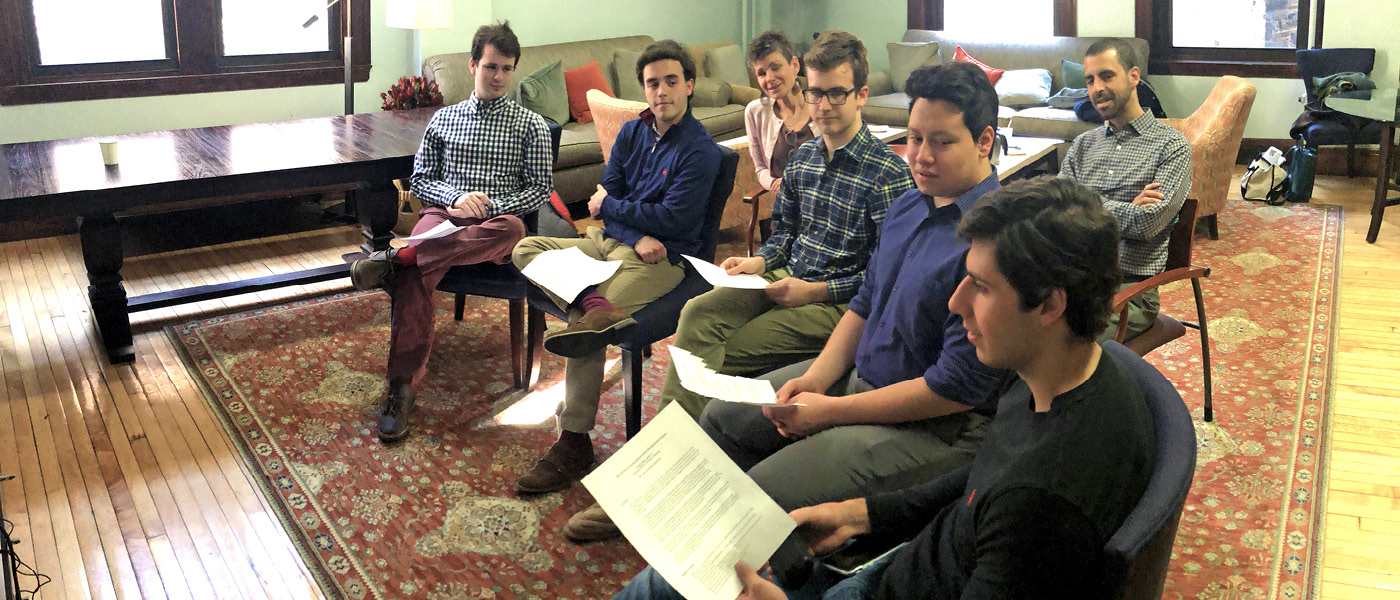
Mousa Adely ’18 (far right) provided translation between Arabic and English during a video conference call with the Jesuit Refugee Services youth club in Beirut.
“Where are you from?” The question is asked more often at Regis than other schools, with answers ranging from “around the corner” to “the next state over.” But when a group of seniors posed it at the beginning of class on April 11, they did not bargain for the shock they felt at hearing names they associated with destruction: “Raqqah”; “Aleppo”; “Damascus”. But shocked—“in a very positive way,” according to their teacher Karin Miller-Lewis—was how these seniors felt during their Skype call with Syrian refugees living in Lebanon.
This bridge-building conversation marked the culmination of the senior elective course “Crossing the Border.” Titled “Crossing the Line” in prior years, the class encourages seniors to “open up creative channels across art forms and media.” While in past years the lines being crossed were artistic, according to co-teacher Justin Kiczek, “this year, we knew that we wanted to try something new.”
Inspiration came from Regis’s ongoing curriculum review, which has emphasized the need for students to “engage with contemporary problems and engineer solutions.” Few “contemporary problems” are in as great a need of solutions as this, so Kiczek and Miller-Lewis decided to encourage students to “think about the crossing of borders instead of lines.”
Shifting focus did not mean losing the multimedia exploration that makes “Crossing the Border” unique. The course has “explore[d] the diverse experience of refugees” through “journalism and arts forms such as literature, music, film, and new media,” Miller-Lewis says, and “use[d] virtual reality to witness life in camps.”
After learning about the experience of refugees from every angle, these Regians were eager to converse with peers living through it. Their opportunity came with the April 11 Skype call with members of the Frans van der Lugt Centre, the Jesuit Refugee Services youth club in Beirut. As with any genuine dialogue, the Skype call had its difficulties. The technical struggles, however, did nothing to lessen the enthusiasm of both sides. Senior Mousa Adely ’18, the son of Jordanian immigrants, provided translation between Arabic and English.
The Syrians followed the initial question of the Regians—“where are you from?”—with one of their own: “What would you do” if your country broke into civil war?
“The question registered in their bodies,” Miller-Lewis recounts. The students clearly recognized the gravity of trying to imagine what someone else was actually experiencing. Yet that effect, Kiczek and Miller-Lewis believe, is an important step toward seeking a solution. “In developing the course, we realized that the key to action was developing empathy.”
Near the end of the Skype call, one Regian asked, “What are your hopes for the future?” All of these young refugees, forced from their homes, expressed their desire to travel. With so much left to learn, these Regis students are eager to continue the conversation with these new friends—and to turn their deepening empathy into action.